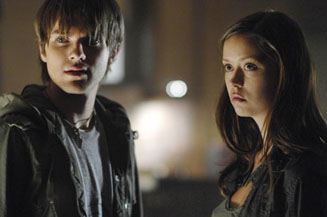Mythology
Terminator: The Sarah Connor Chronicles
By Martin Felipe
May 27, 2009
BoxOfficeProphets.com

Before he won his three Oscars, James Cameron created the Terminator mythology for the big screen. We all know the story; artificial intelligence destroys the world except for a resistance led by John Connor. They send a killer cyborg back in time to the '80s to kill Connor's mother, Sarah. A resistance fighter named Kyle Reese also goes back and fathers John. Much has been written about how simple the concept is, yet how rich the potential of the mythology. And, at one time, I agreed.
By the time the third movie came out the cracks started showing. Cameron and Sarah Connor (otherwise known as Linda Hamilton) sat the third one out and, for the first time, the story started to feel redundant. Don't misunderstand me, I still dig it. The action sequences are top notch, the acting decent enough, and Terminatrix Kristanna Loken is a head turner to put it mildly, but it really brings nothing new to the table, save perhaps for a course correcting theme that makes Judgment Day inevitable, but I'll get to that in a second.
I love the idea of a female terminator. It's just that it's really no different from the liquid metal terminator from T2, from a storytelling point of view. Really, that's all she is, a liquid metal terminator with a hot body. Nor is the idea of Arnold coming back as a protectinator anything we haven't seen from the previous installment either. So, despite some solid entertainment, Terminator 3 really just wheel spins long enough for the world to end, despite the efforts of Sarah, John, and Good Arnold in T2.
Which is where the series kicks in. It drops most of the continuity of the third film, but retains the course correction theme. The machine apocalypse is coming, and all Sarah and John can do is delay it for a bit.
The pilot debuted in the midst of the infamous writers' strike and, as there was very little new televised material for consumers at the time, pulled in some big numbers. Fans were worried that their precious franchise might be sullied in a small screen format. Yet the pilot remains fairly true to its big screen progenitor. The action is intense, the effects are solid, and we have good and bad terminators from the future coming to save and kill John Connor.
It's a lot of fun to be sure, but we know where this is all going. The world's gonna end. While not a prequel per se, the show does have the disadvantage of all prequels in that we already know the ending. And we need some compelling characters or some compelling plotting to keep us involved.
Well, here's the thing, as we watch the pieces fall into place for the coming war, we see the pattern repeating - some terminator threat chases Sarah and John. Thanks to John's cleverness, Sarah's badassness, and a hero terminator, they get out of another scrape. And another. And another.
Problem is, while most mythology shows go for epic sweep, Terminator's always been an intimate tale. Yes, the apocalypse is a pretty sweeping subject for a story, but Terminator is really just a mother/son story. And when Terminator 2 came out, we'd seen precious few such stories. Hell, we still see very few of them. It's just that Sarah and John need something else to do other than run.
Now there is the slowly developing Skynet plot, watching the machines come to dominance, en route to the unstoppable war. Again, prequel-itis. It's fun, and there are some interesting themes about the nature of humanity, but it still all comes down to characters.
Sarah Connor is a super-protective mother, going to extreme lengths to protect her son. Okay, she's certainly interesting enough when Linda Hamilton plays her. Lena Headey has the gravitas for the role, but lacks any humor. As such, her uncompromising toughness starts to grate and bore.
Thomas Dekker has a tough role. I think fan complaints at his emo petulance were pretty unfair. John isn't born a savior, he develops into one. This slow evolution could have been interesting - certainly more so than Sarah's stagnant brutality - but teen Connor proved to be as off-putting to Terminator fans as teen Anakin did to Star Wars fans.
Protector Terminator Cameron is really no different that Protector Terminator Arnold, but, in the body of charismatic actress Summer Glau, male fans certainly rallied behind her, and all purient thoughts aside, she provides some of the more entertaining character moments. She's the Data of the show, learning what it is to be human, while demonstrating how she's anything but. I really feel the future of the show would have rested on this character, had the show been granted a future.
And then there's Brian Austin Green as Kyle Reese's brother (or cousin, or something), Derek. I don't have any idea what his character's like, and I don't think Green does either.
Without a more interesting group of characters around whom to rally, we're left with a story, the ending of which we've seen. So I guess cancellation really doesn't matter. We know what season three would have been like. Terminators would have tried to kill John, Cameron would have stopped it, Skynet would have inched closer to dominance. Really, all Fox did by canceling the show is save us from seeing history repeat...and repeat...and repeat. And the rapidly depleting ratings are evidence of how bored fans got watching the endless cycle. The end really was inevitable.